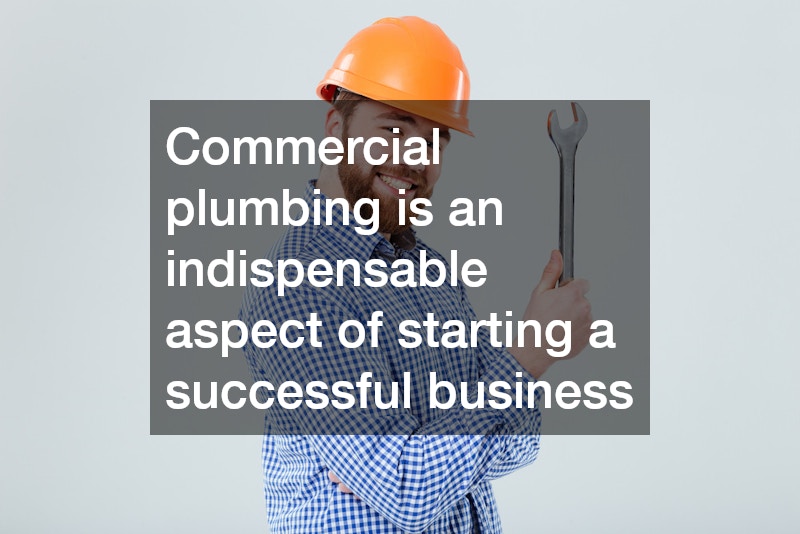
Opening a new business involves numerous considerations, among which commercial plumbing plays a crucial role. Ensuring a reliable and efficient plumbing system is essential for seamless daily operations. Moreover, a well-designed plumbing infrastructure supports the sustainability and growth of your business by preventing costly interruptions.
What are the Essential Components of a Commercial Plumbing System?
Pipes and Fixtures
Pipes and fixtures are the backbone of any plumbing system, connecting various areas of a business and facilitating the flow of water. Commonly used materials for pipes include PVC, copper, and galvanized steel, each offering specific benefits in terms of durability and application. Fixtures, such as faucets, toilets, and sinks, are selected based on functionality and water efficiency to support business needs effectively.
The correct selection and installation of pipes can significantly impact the efficiency and lifespan of a plumbing system. Investing in high-quality fixtures not only enhances the aesthetic appeal of your business but also contributes to water conservation efforts. The combination of the right pipes and fixtures ensures a reliable water supply, critical for uninterrupted business operations.
Choosing the right materials and designs for pipes and fixtures can prevent frequent breakdowns and reduce maintenance costs.
Water Heaters and Boilers
Water heaters and boilers are integral to maintaining consistent hot water supply for sanitation and operational needs. Selecting the right capacity and type of heater ensures that your business can meet its daily hot water demands efficiently. Efficient water heating systems minimize energy consumption, translating to long-term cost savings for your enterprise.
For businesses like restaurants or healthcare facilities, a steady hot water supply is imperative for smooth operations and compliance with health standards. It’s essential to choose energy-efficient models that align with the business’s operational hours to avoid unnecessary expenses. Regular maintenance and timely upgrades to water heaters and boilers prevent disruptive breakdowns, ensuring business continuity.
Implementing smart technology solutions in heating systems can further optimize energy use and enhance control over operational consumption. Modern water heaters with eco-friendly designs not only support sustainability but also appeal to environmentally conscious consumers.
Drainage and Sewer Systems
Properly designed drainage and sewer systems are essential to avoid blockages, overflow, and potential hygiene issues in commercial settings. Regular maintenance and inspections of these systems help in early detection and prevention of costly plumbing issues. Advanced drainage systems can effectively manage waste and stormwater, safeguarding both the environment and your business premises.
Implementing effective grease traps and interceptors in restaurants, for instance, prevents grease buildup that can lead to severe blockages. Drainage systems should be customized to handle the specific waste output and environmental conditions unique to your business location. Ensuring that these systems are up to code is imperative for maintaining operational certification and avoiding penalties.
How Does Commercial Plumbing Affect Business Operations?
Operational Efficiency
A well-maintained plumbing system is essential for efficient daily operations, minimizing downtime and interruptions. Timely repairs and upgrades to plumbing infrastructure can prevent issues that may halt production or service delivery. Consistent water supply and efficient sanitation systems contribute to a positive working environment and customer experience.
Inadequate plumbing can lead to leaks, overflows, and water shortages, disrupting business activities and reducing productivity. Investing in high-quality plumbing materials reduces the likelihood of frequent breakdowns and costly repairs. Efficient plumbing systems also support energy conservation efforts by minimizing water waste and regulating pressure according to usage needs.
For businesses that rely heavily on plumbing, such as hospitality and healthcare, operational efficiency is directly tied to the reliability of their systems. Strategic planning of plumbing layouts ensures optimal flow and pressure throughout the premises.
Health and Safety Compliance
Health and safety compliance is integral to the operational legitimacy of any business, and proper plumbing plays a pivotal role in achieving it. Ensuring that all plumbing installations meet regulatory standards prevents legal issues and potential fines. Regular inspections and maintenance are necessary to keep the system fully functional and compliant with health codes.
Businesses, especially those in the food and healthcare industries, are required to maintain stringent hygiene standards, which are heavily dependent on reliable plumbing systems. Implementing industry-standard practices and technologies contributes to the overall safety of employees and customers. Adhering to these regulations not only enhances business longevity but also builds customer trust and loyalty.
Upgrading to modern plumbing solutions that meet health and safety benchmarks can provide a competitive edge while ensuring compliance. Professional plumbers with expertise in commercial installations can provide guidance and services that align with regulatory demands.
Cost Management
Investing in quality commercial plumbing can greatly impact cost management by reducing long-term expenditures. While upfront costs of installing high-quality pipes and fixtures may be higher, these initial investments pay off in terms of durability and reduced need for frequent repairs. Efficient water systems also contribute to lower utility bills by conserving resources.
Predictive maintenance strategies can further optimize costs by identifying potential issues before they escalate into significant problems. Leveraging technology to monitor water usage helps businesses adjust practices that waste water and energy. Cost-effective plumbing solutions not only enhance profitability but also promote sustainable business practices.
Commercial plumbing is an indispensable aspect of starting and maintaining a successful business venture. From the selection and installation of essential components to regular maintenance, plumbing plays a key role in operational efficiency, safety compliance, and cost management. As businesses seek sustainable growth, investing in robust plumbing solutions not only mitigates risks but also enhances competitive advantage in today’s dynamic market environment.
.

